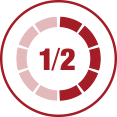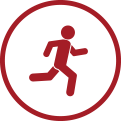

About
AZOR® (amlodipine and olmesartan medoxomil)
AZOR has been proven to help lower blood pressure
AZOR lowers high blood pressure, which can help lower your risk of heart attack and stroke. There are no clinical studies demonstrating risk reduction with AZOR. AZOR widens and relaxes blood vessels 2 ways to help lower blood pressure. Curious to learn more about how AZOR works? Watch the video here.
Although there was variation in blood pressure response, the overall blood pressure lowering effect of AZOR taken once a day was maintained throughout the 24-hour period
Lower blood pressure results were seen in as little as 14 days
Please note that individual results may vary. It is important to take your high blood pressure medicine as directed by your doctor. After starting medicine, please speak with your doctor if you have questions about your blood pressure numbers or the medicine itself.

Is AZOR right for you?
Only your doctor can tell you. Get your questions answered at your next visit with help from this Doctor Discussion Guide.
DOWNLOAD NOWSelected Important Safety Information
Do not take BENICAR, BENICAR HCT, AZOR, or TRIBENZOR if you:
- Take medicine that contains aliskiren and you have diabetes or kidney problems
For Important Safety Information, please see below.
Get information about taking AZOR
REFERENCES:
1. American Heart Association. The Facts About High Blood Pressure.
Available at http://www.heart.org/HEARTORG/Conditions/HighBloodPressure/GettheFactsAboutHighBloodPressure/The-Facts-About-High-Blood-Pressure_UCM_002050_Article.jsp#.WlP2QktG2gR. Accessed January 8, 2018.
2. American Heart Association. Health Threats From High Blood Pressure.
Available at http://www.heart.org/HEARTORG/Conditions/HighBloodPressure/LearnHowHBPHarmsYourHealth/Health-Threats-From-High-Blood-Pressure_UCM_002051_Article.jsp#.WlP34UtG2gQ. Accessed January 8, 2018.
3. American Heart Association. Get the Facts About High Blood Pressure.
Available at http://www.heart.org/HEARTORG/Conditions/HighBloodPressure/MakeChangesThatMatter/Changes-You-Can-Make-to-Manage-High-Blood-Pressure_UCM_002054_Article.jsp#.WlP2VEtG2gT. Accessed January 8, 2018.
INDICATIONS
BENICAR, BENICAR HCT, AZOR, and TRIBENZOR are prescription medicines used to lower high blood pressure (hypertension) in adults. BENICAR may be used in pediatric patients six years of age or older to lower high blood pressure. Medicines that lower blood pressure lower the chance of having a stroke or heart attack. The safety and effectiveness of BENICAR HCT, AZOR, and TRIBENZOR in pediatric patients have not been established.
Patients may require more than one type of blood pressure lowering medication. Along with lowering blood pressure, a complete treatment plan to lower the chance of a stroke or heart attack may include exercise, a diet low in sodium, stopping smoking, controlling cholesterol, treatment or prevention of blood clots, and controlling blood sugar.
BENICAR, BENICAR HCT, AZOR, and TRIBENZOR may be used alone or with other medicines to treat high blood pressure.
AZOR may be used as the first medicine to treat high blood pressure in people who are likely to need more than 1 blood pressure medicine to reach their blood pressure goals.
AZOR is not for use as the first medicine to treat high blood pressure for people who are 75 years of age and older or have liver problems.
BENICAR HCT and TRIBENZOR are not for use as the first medicine to treat high blood pressure.
Important Safety Information for BENICAR®, BENICAR HCT®, AZOR®, and TRIBENZOR®
WARNING: DO NOT TAKE BENICAR, BENICAR HCT, AZOR, OR TRIBENZOR DURING PREGNANCY
- BENICAR, BENICAR HCT, AZOR, and TRIBENZOR can cause harm or death to an unborn baby
- Talk with your doctor about other ways to lower your blood pressure if you become pregnant
- If you get pregnant while taking BENICAR, BENICAR HCT, AZOR, or TRIBENZOR, tell your doctor immediately
Please see the WARNINGS AND PRECAUTIONS section of the Full Product Information about Fetal Toxicity.
Do not take BENICAR, BENICAR HCT, AZOR, or TRIBENZOR if you:
- Take medicine that contains aliskiren and you have diabetes or kidney problems
Do not take BENICAR HCT or TRIBENZOR if you:
- Have less urine than normal or if you cannot urinate
- Are allergic to any component of this medicine
- Are allergic to other sulfonamide type medicines
- Have not taken any other medicines to treat your high blood pressure before
Children that are less than 1 year of age must not receive BENICAR for high blood pressure. Children of any age should not receive AZOR, BENICAR HCT, or TRIBENZOR.
Before taking BENICAR, BENICAR HCT, AZOR, or TRIBENZOR, tell your doctor if you are pregnant or plan to become pregnant as soon as possible. Also tell your doctor if you are breast-feeding or plan to breast-feed. A medicine in BENICAR HCT and TRIBENZOR can pass into your breast milk. This may harm your baby. You and your doctor should decide if you will take BENICAR, BENICAR HCT, AZOR, or TRIBENZOR or breast-feed. You should not do both. (Please see Boxed WARNING regarding Fetal Toxicity).
Let your doctor know about any health conditions you may have
Tell your doctor if you are allergic to any of the ingredients in BENICAR, BENICAR HCT, AZOR, or TRIBENZOR (see Full Product Information for a list of the ingredients in BENICAR, BENICAR HCT, AZOR, or TRIBENZOR, as applicable). Also let your doctor know if you have any of the health conditions listed below:
|
Before you take these medicines: |
Let your doctor know if you have these, or any other, medical conditions: |
|
BENICAR |
|
|
BENICAR HCT |
|
|
AZOR |
|
|
TRIBENZOR |
|
Tell your doctor about all the medicines you take
Some of your other medicines and BENICAR, BENICAR HCT, AZOR, or TRIBENZOR could affect each other. This may cause serious side effects.
These medicines may include prescription and nonprescription medicines, vitamins, and herbal supplements:
|
If you take BENICAR, tell your doctor if you also take: |
If you take AZOR, tell your doctor if you also take: |
|
|
|
If you take BENICAR HCT, tell your doctor if you also take: |
If you take TRIBENZOR, tell your doctor if you also take: |
|
|
About alcohol and other drug interactions
If you are taking TRIBENZOR do not drink alcohol. Your blood pressure may become too low if you drink alcohol.
Some of your other medicines and BENICAR, BENICAR HCT, AZOR, or TRIBENZOR could affect each other. This may cause serious side effects. Take BENICAR, BENICAR HCT, AZOR, or TRIBENZOR as prescribed by your doctor. Talk with your doctor before you stop taking BENICAR, BENICAR HCT, AZOR, or TRIBENZOR.
Know about possible side effects
For BENICAR, BENICAR HCT, AZOR, and TRIBENZOR
Serious side effects may include injury or death to an unborn baby; low blood pressure (hypotension), which may cause you to feel faint or dizzy; and kidney problems, which may get worse in people with kidney disease. If you have kidney problems, you may need blood tests, and your doctor may need to lower your dose. Tell your doctor if you get swelling in your feet, ankles, or hands, or have unexplained weight gain. These may be signs of kidney problems. If you have heart failure, your doctor should also check your kidney function before prescribing these medicines. Tell your doctor if you are experiencing these symptoms.
Serious side effects may also include severe, chronic diarrhea with considerable weight loss, which may develop months to years after starting BENICAR, BENICAR HCT, AZOR, or TRIBENZOR. Tell your doctor if you are experiencing these symptoms.
Additional side effects for BENICAR and BENICAR HCT only
Because of the thiazide diuretic (water pill), an ingredient in BENICAR HCT, other serious side effects may include allergic reactions and changes in body salts (such as sodium and potassium) and fluids. Tell your doctor if you have these signs and symptoms: dry mouth, thirst, weakness, tiredness or sleepiness, restlessness, confusion, seizures, muscle pains or cramps, muscle tiredness, dizziness or fainting, having little or no urine output, or nausea and vomiting.
The thiazide diuretic in BENICAR HCT can also cause eye problems, which may lead to vision loss. Symptoms can happen within hours to weeks of starting BENICAR HCT. Tell your doctor if you have a decrease in vision or eye pain.
The most common side effect of BENICAR and BENICAR HCT was dizziness. Other side effects of BENICAR HCT included upper respiratory tract infections, more uric acid in the blood, and nausea.
Do not take BENICAR HCT as your first medicine for the treatment of your high blood pressure.
Additional side effects for AZOR only
Because of amlodipine, an ingredient in AZOR, other serious side effects may include worsening chest pain or heart attack. Get medical help right away if you have chest pain that gets worse or does not go away.
The most common side effect of AZOR was swelling from fluid buildup in the body. Other less common side effects were blood pressure that is too low; blood pressure that becomes too low after standing up too quickly; rash; itching; pounding or racing heartbeat; more frequent urination; and excessive urination at night. Other side effects may include headache, dizziness, and redness of the face and neck (flushing).
Do not take AZOR as your first medicine for the treatment of your high blood pressure if you have liver problems or if you are 75 years of age and older.
Additional side effects for TRIBENZOR only
Because of amlodipine, an ingredient in TRIBENZOR, other serious side effects may include chest pain that gets worse or heart attack. Get medical help right away if you have chest pain that gets worse or does not go away. TRIBENZOR also contains a thiazide diuretic (water pill), which may cause allergic reactions and changes in body salts (such as sodium and potassium) and fluids. Tell your doctor if you have signs of a change in body salts and body fluids. Signs of a change include: dry mouth, thirst, weakness, tiredness or sleepiness, or restlessness. These signs may also include confusion, seizures, muscle pains or cramps, muscle tiredness, dizziness or fainting, having little or no urine, fast heartbeat, and nausea and vomiting.
The thiazide diuretic in TRIBENZOR can also cause eye problems which may lead to vision loss. Symptoms can happen within hours to weeks of starting TRIBENZOR. Tell your doctor right away if you have a decrease in vision or eye pain.
The most common side effects of TRIBENZOR include dizziness; swelling of the ankles, feet, and hands; headache; tiredness; stuffy or runny nose and sore throat; muscle twitching (spasms); nausea; upper respiratory tract infection; diarrhea; urinary tract infection; and swelling of the joints.
Do not take TRIBENZOR as your first medicine for the treatment of your high blood pressure.
Tell your doctor if you have any side effect that bothers you or does not go away. Not all the possible side effects of BENICAR, BENICAR HCT, AZOR, or TRIBENZOR have been mentioned in the Important Safety Information. For more information, talk with your doctor or pharmacist. Call your doctor for medical advice about side effects.
To report side effects, contact Cosette Pharmaceuticals, Inc., at 1-800-922-1038 or the FDA at 1-800-332-1088 or www.fda.gov/medwatch.
Please see Full Prescribing Information for BENICAR, BENICAR HCT, AZOR, and TRIBENZOR
Prescribing Information
All FDA-approved drugs have product information, a document that contains information healthcare providers need to know when prescribing FDA-approved drugs.






